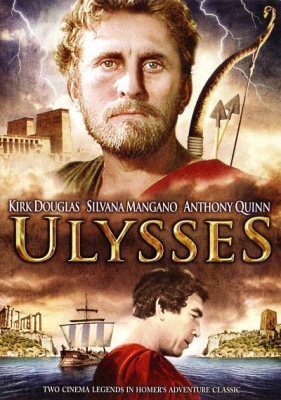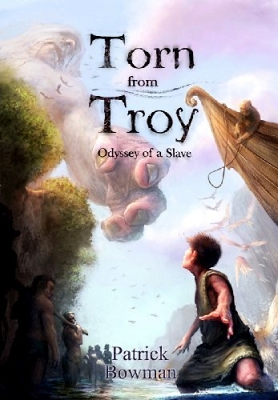
Movie
First Released: 1954
Run Time: 115 minutes
Starring: Kirk Douglas (Ulysses), Silvana Mangano (Penelope, Circe), Anthony Quinn (Antinous), Rossana Podestà (Nausicaa)
Synopsis: This lush adaptation of Homer’s grand epic the Odyssey stars Kirk Douglas as the hero Ulysses. After victory in the Trojan War, Ulysses embarks on a ten-year journey back to his kingdom. But before he can reunite with his beloved wife (Silvana Mangano), he must defeat the brutal Cyclops, escape the spell of Circe who turns his crew into swine, and outwit the Sirens who lure sailors to their death. Peril is everywhere — even at home, where the arrogant Antinous (Anthony Quinn) plots to steal Ulysses’ wife before he can complete his final quest in this powerful tale of heroism.
My Thoughts: The eight-episode miniseries Troy: Fall of a City is due to hit the BBC and Netflix next year and I am pretty ridiculously excited. Thinking that I should stop wasting that excitement on constantly refreshing the series’ IMDb page, I decided instead to watch some of the older Trojan War-related movies that I hadn’t seen. First up, Kirk Douglas makes his second appearance on this blog (following his role as Peter in Mourning Becomes Electra), this time as the star of the 1954 peplum Ulysses.
Douglas’s Ulysses is hard to get a handle on. We first see him for just a split second during a flashback to the fall of Troy. Then we see his meeting with Nausicaa, where he has lost his memory. (I’m not sure why the filmmakers introduced this idea and I’m not even sure what the in-story reason for it is supposed to be. His memory returns with equally little reason.) After a bit of that, we get a flashback to Ulysses and his men as they almost humourously stumble upon the cave of the Cyclops. This movie gives us three different introductions to its main character and he acts differently in each one. This is a problem that continues throughout the movie — sometimes Ulysses wants to go home, sometimes he wants to go on an adventure, sometimes he’s desperate to keep moving, sometimes he’s content to stay in the same room for months. Not to say that you can’t have a Ulysses with contradictions — of course you can — but this movie feels like a highlight reel of the Odyssey, jumping from scene to scene with little care taken to ensure that they fit together as a whole. Ulysses doesn’t seem to change because of his personality or his experiences; he changes to suit the filmmakers’ plans for whatever scene is up next. The editing is abrupt, Greek names are mixed with Roman names (Zeus and Athena but Ulysses and Neptune), and the Cyclops scene doesn’t even include the “Nobody” ruse, which was an odd surprise.
Another thing that stood out to me is how much in this movie happens offscreen. It’s true that I don’t really need to see the Cyclops’ eye being stabbed, but when Ulysses shows up in Ithaca talking about how he just spoke with Athena? That feels like an odd scene to leave out. Definitely the biggest offender comes in the very last moment of the movie, when Ulysses is about to finally embrace the wife he hasn’t seen in twenty years, and — he steps offscreen. End movie. Roll credits.
What kind of movie gives the hero his happy ending but doesn’t let you see it?
Thinking about this scene made me curious, so I went back and rewatched the two scenes where Ulysses and Penelope converse, and I discovered that the two characters are only in the same frame for a grand total of about eight seconds. And it happens at the end of the scene where she doesn’t even know it’s him! I don’t know if this has something to do with the fact that this movie was filmed with Douglas (and Quinn) saying his lines in English and everyone else saying their lines in Italian, but it’s baffling! We don’t even get one nice shot of the reunion to cheer us up after the bloody homecoming scene.
Perhaps I shouldn’t rag on this movie so much when almost everything above is something I thought of after I finished it. I enjoyed it while I was watching it! The story moves quickly and the sets and costumes are well done; I especially liked Circe’s sparkling outfits. The effects used to make the Cyclops are also pretty good, if a little uncanny valley at times. Silvana Mangano plays both Penelope and Circe, which is an interesting idea. I thought the Siren scene was surprisingly good — just one long take of Ulysses as he panics because he believes he’s sailing away from Ithaca — and Ulysses’ reunion with Telemachus was as moving as his reunion with Penelope should have been. Rossana Podestà, who would play the title role in Helen of Troy two years later, brings a calm but youthful energy to Nausicaa that I really liked, although the English language version of this movie can’t decide how to pronounce her name. I also liked Anthony Quinn’s scheming Antinous and wouldn’t have minded seeing a little more of him.
So that’s Ulysses. Pretty uneven, but not awful. Although to be honest, I think it’s the type of mindless movie where, if I hadn’t watched it with the intention of reviewing it, I already would’ve forgotten about it.
Buy it at: Amazon.com, Amazon.ca
 Patrick Bowman: Torn from Troy
Patrick Bowman: Torn from Troy Takashi Atoda: Shin Toroia Monogatari
Takashi Atoda: Shin Toroia Monogatari